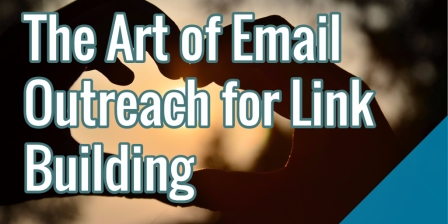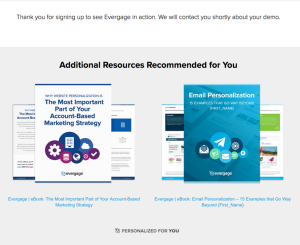Getting traffic to your blog can be a tricky thing, especially when you’re reaching out to a very specific customer niche. While the key is still to have great content, it can’t hurt to reach out to people to gain backlinks to your site and help jump start your traffic. Link building is important to building credibility, increasing traffic and raising your search engine page ranking. But people won’t know about your site unless you tell them about it. That’s why you need email outreach.
Email outreach is an old-school link building method that marketers have been using for years. But simply cold-sending email, without using the proper techniques, can be very difficult. Most of these influencers get hundreds of emails a day and if you don’t make yours stand out, it could quickly get buried.
While it does take some work to be effective, email outreach is a great technique that powers several link building strategies. It helps build relationships with other blogs and influencers to continue helping each other win in the future.
Here we’ll go over four types of high-converting emails, tips on what to include in them and tools to help you.
Guest Blogging
There’s no question that guest blogging is a win-win situation for both parties. They get a quality post for their site that they don’t have to write, and you land backlinks on sites with a lot of domain authority. Even better, by being featured as a guest blogger on these sites, viewers will look up to you as an expert on the topic.
But not just anyone will let you post something to their site. There are a couple important things to include in your guest post pitch that will make you stand out in a crowd of pitch emails.
1. Pitch to their style. Have a look around their blog first to understand what they would be interested in hearing about. What topics do they cover? Are their pieces short and concise, or long and educational? Do they like to include infographics or videos? Tailoring your pitch to fit this style will make sure your article is a good fit for their blog. And of course, make sure you don’t pitch a topic that’s already been written.
2. Understand their audience. Every blog is speaking to a specific customer-base, whether it’s experienced B2B marketers or new app developers. You need to make sure your pitch covers topics that would interest their reader audience. To get a good sense of this, you may want to visit at least three other sites that their target reader is likely to read to get an understanding of what’s going on in their industry.
3. Emphasize the value you’re giving them. Everyone likes to hear about how you can help them. By making the focus of your pitch about how your post can help them accomplish their goals for the blog, they’re more likely to want to hear more.
Find Contact Information With Clearbit Connect
Clearbit Connect is a great tool to help with tracking down contact information for people you’re interested in contacting about your pitch. Right from your Gmail Compose window, you can search for contacts by company name and target role. You can also find contextual data about a company or potential contact to see if they would be a good fit for a guest post.
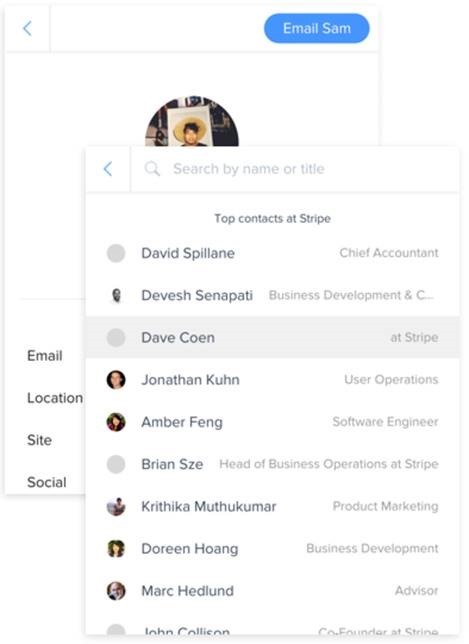
Cite Them As An Expert Source
Rather than asking to feature on their site, instead offer someone a featuring on yours. Of course, most experts are very busy people so making the process as frictionless as possible for them will increase the chance that they’re likely to accept.
One great way to get expert input for an article, without asking for much of their time, is to send out a simple survey. In the email, you can describe the study that you’re conducting and how you’d love to get their take on the subject. Then you can mention how you’ll publish their answers as part of the post and link to their site, and ask for a simple share in return. By citing them as a source, you’re giving them more traffic while also building backlinks to your post.
An even more frictionless way is by including a site in a “best practices” or “top tools” post that you’re writing and asking for a simple share or link back after it’s already published and doing well.

Here, citing his experience with sending good emails, Jimmy is asking Alex for his advice to include in a huge post. With minimal effort on Alex’s part, he’s getting featured in a post that will likely get him many new viewers to his blog.
Find Influencers With Followerwonk
Followerwonk is a great tool to help you find influencers specific to your field of interest. By working with Twitter data, it can find and compare the most influential accounts and help you search Twitter bios for information on how to connect with them.
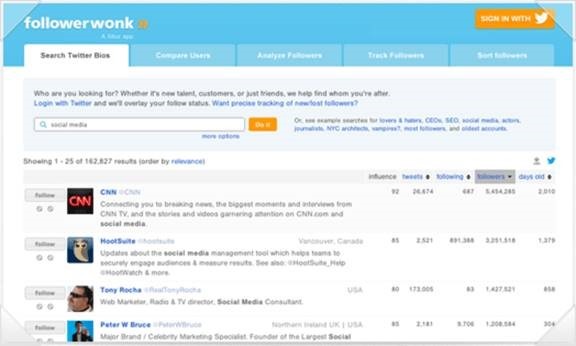
Offer Your Product To Them For Free
Never underestimate the power of FREE. Most people are more than happy to try out your product if they don’t have to pay anything for it.
This is a great technique to get the word out, especially for consumer products. Say you’re starting a new makeup company that only uses organic ingredients in your products. You know people will love your products, but just need to get the word out about your brand. In an industry where there’s so many brands and products to choose from, consumers often look to popular makeup bloggers for advice on what to try.
Reaching out to these bloggers offering a sample of your product for free is a great way to spread the word. In return, you can ask for an honest review and referral to your site if they love the product.
Track Competitor Backlinks With Ahrefs
Ahrefs is a great tool to find who your top competitors are and who their customers are. You can even set up Backlink Alerts so you are notified when someone links to a competitor. This can give you a sense of who would be willing to test your product and write a review, bringing more customers to your site.
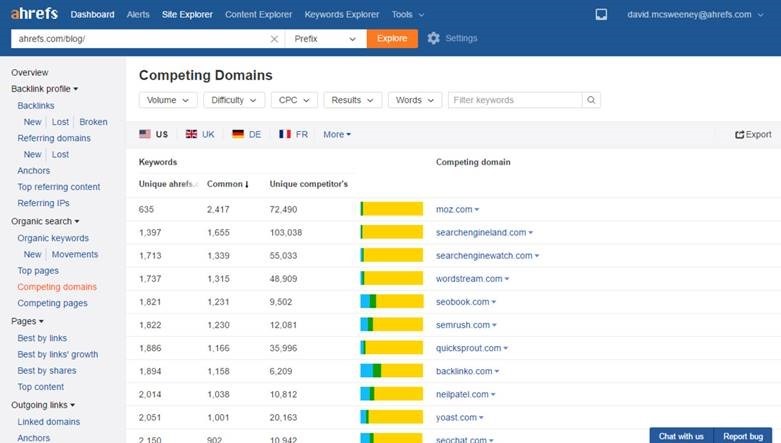
Just Ask
You know you’ve spent hours writing and revising great content for your site. You’re presenting a unique view and actionable advice that you think is very valuable for potential customers. All you need is a strong enough email pitch and you know your content will stand on its own.
There are a couple ways to make your email stand out among the many requests your contacts are likely getting:
1. Highlight the value. You know the value, but they don’t (yet!). Make that the focus and highlight how it will appeal to their readers.
2. Personalize it. Make sure you’re addressing the specific points that are relevant to your contact. Also be sure to make it absolutely clear what you’re asking of them. The less thinking they have to do, the better.
3. Be concise. Get right to the point and don’t waste time on fluff. The more they have to read, the less likely they are to read it. Don’t give them that option.
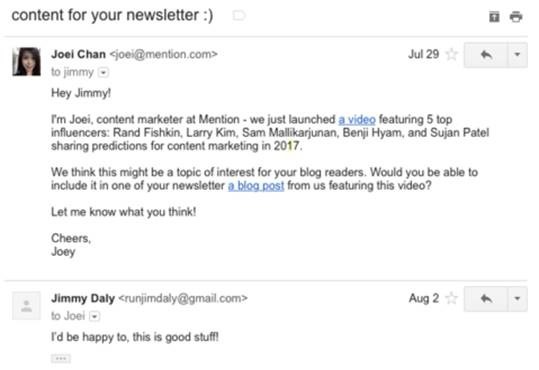
This email is a great example of getting straight to the point and making it hard for the reader to say no. In under 100 words, the value is delivered and the request is made.
Follow Up With Contacts With Followup.cc
The key to sending cold emails is to not get discouraged. Just because you haven’t gotten a response off the bat doesn’t mean they hate your content. It’s more than likely your email was buried in their inbox or they meant to respond but then forgot.FollowUp.cc is a great tool to help coordinate follow up, without taking up too much of your time. You can set up notifications for when people open your email and automate follow-up responses if you don’t hear back within a few days. This way you can set it and forget it, but your contacts don’t forget about you.
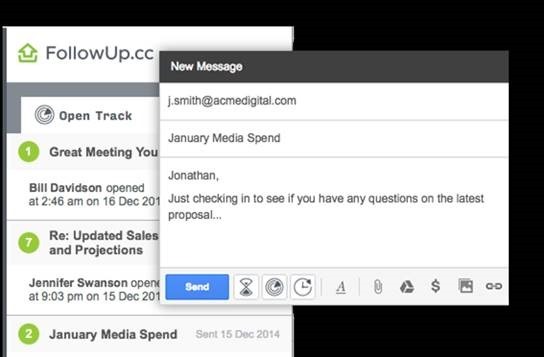
Send Great Emails
Email outreach is a powerful tool to help grow your blog, but you need to make sure the focus of the emails is on them. By helping those you’re reaching out to and offering them value, you’re helping yourself. By nurturing and following up with any connections you do make, you can build a network of people helping each other win, just by sending a great email!
* Adapted lead image: ![]() Public Domain, pixabay.com via getstencil.com
Public Domain, pixabay.com via getstencil.com
The Art of Email Outreach for Link Building
The post The Art of Email Outreach for Link Building appeared first on Search Engine People Blog.
Search Engine People Blog(129)
Report Post